Tracking real estate price trends is crucial for anyone involved in the property market.
Whether you’re a homebuyer, seller, investor, or simply curious about housing dynamics, staying informed about price fluctuations can give you a significant advantage.
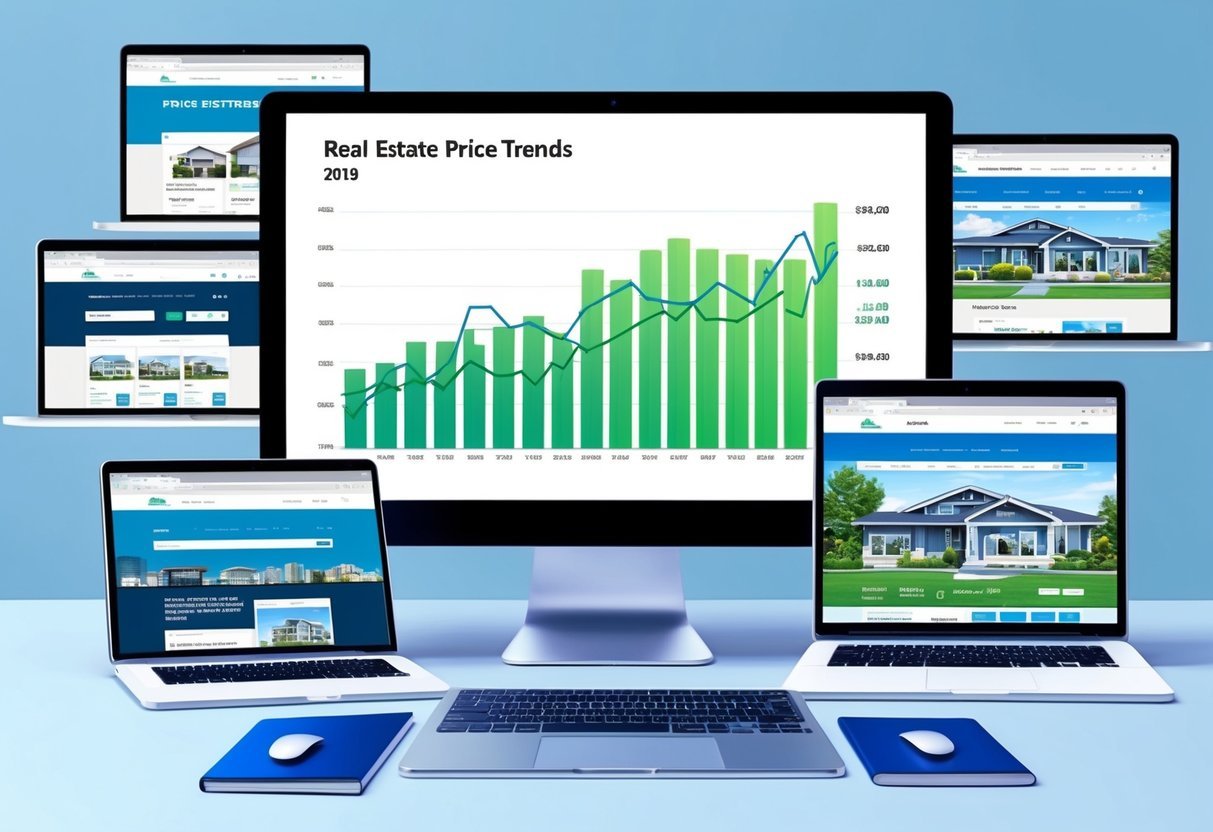
You can make more informed decisions about when to buy, sell, or invest in property by utilizing reliable websites that offer comprehensive real estate data.
These online resources provide valuable insights into market conditions, historical trends, and future projections, empowering you to navigate the complex world of real estate with greater confidence and precision.
1) Zillow
Zillow stands out as a premier resource for tracking real estate price trends.
You can access a wealth of housing data through their research platform.
This includes information on home values, rents, sales, and inventory across various geographies and housing types.
The site offers a user-friendly interface that allows you to explore market trends with ease.
You can visualize data through interactive charts and graphs, making it simple to spot patterns and shifts in the real estate landscape.
Zillow’s Home Value Index provides a comprehensive view of property values across the United States.
This tool helps you understand how prices have changed over time in specific areas, from national trends down to local neighborhoods.
For those interested in deeper analysis, Zillow offers downloadable CSV files and an Economic Data API.
These resources enable you to perform your own custom research and integrate Zillow’s data into your own applications or models.
The platform also provides insights beyond just prices.
You can find information on market heat indexes, price cuts, and days on market.
These additional metrics give you a more nuanced understanding of local real estate conditions.
2) Realtor.com
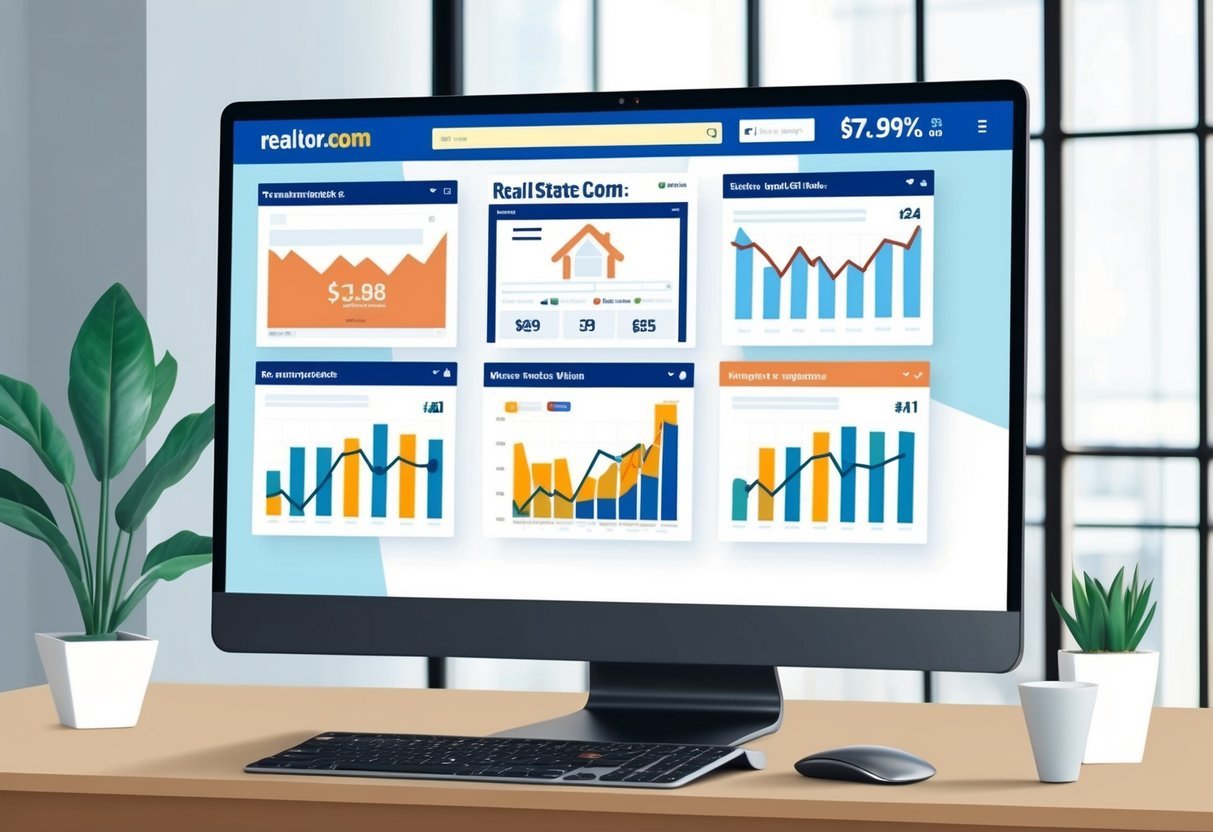
Realtor.com offers a wealth of real estate statistics and market trends to help you stay informed about property prices.
You can access comprehensive data on housing markets across the United States.
The website provides downloadable real estate data broken down by zip code, county, metro area, state, and national levels.
This granular information allows you to analyze price trends in specific locations that interest you.
You’ll find data categorized by property type, price tiers, house size, and number of bedrooms.
This level of detail enables you to focus on the exact type of property you’re considering.
Realtor.com’s research team regularly updates their data and offers forecasts, analysis, and commentary.
You can benefit from their expert insights into market trends and future projections.
The site’s user-friendly interface makes it easy for you to navigate and find the information you need.
You can quickly compare different areas or property types to make informed decisions about real estate investments.
3) Redfin
Redfin offers a wealth of downloadable housing market data to help you track real estate price trends.
As a real estate brokerage, Redfin has direct access to local multiple listing services, providing you with early and reliable information on the housing market.
You can explore the United States Housing Market & Prices page on Redfin to gain insights into market trends.
This resource offers valuable indicators of housing market strength, including the direction and pace of price changes.
Redfin’s data includes the median sale price for all home types, which can help you understand broader market trends.
For example, as of August 2024, the median sale price was $434,050, representing a 3.2% year-over-year increase.
You’ll find Redfin’s information particularly useful for comparing data across different years and tracking price fluctuations.
The site presents this data in easy-to-read graphs, allowing you to visualize market trends quickly.
4) Trulia
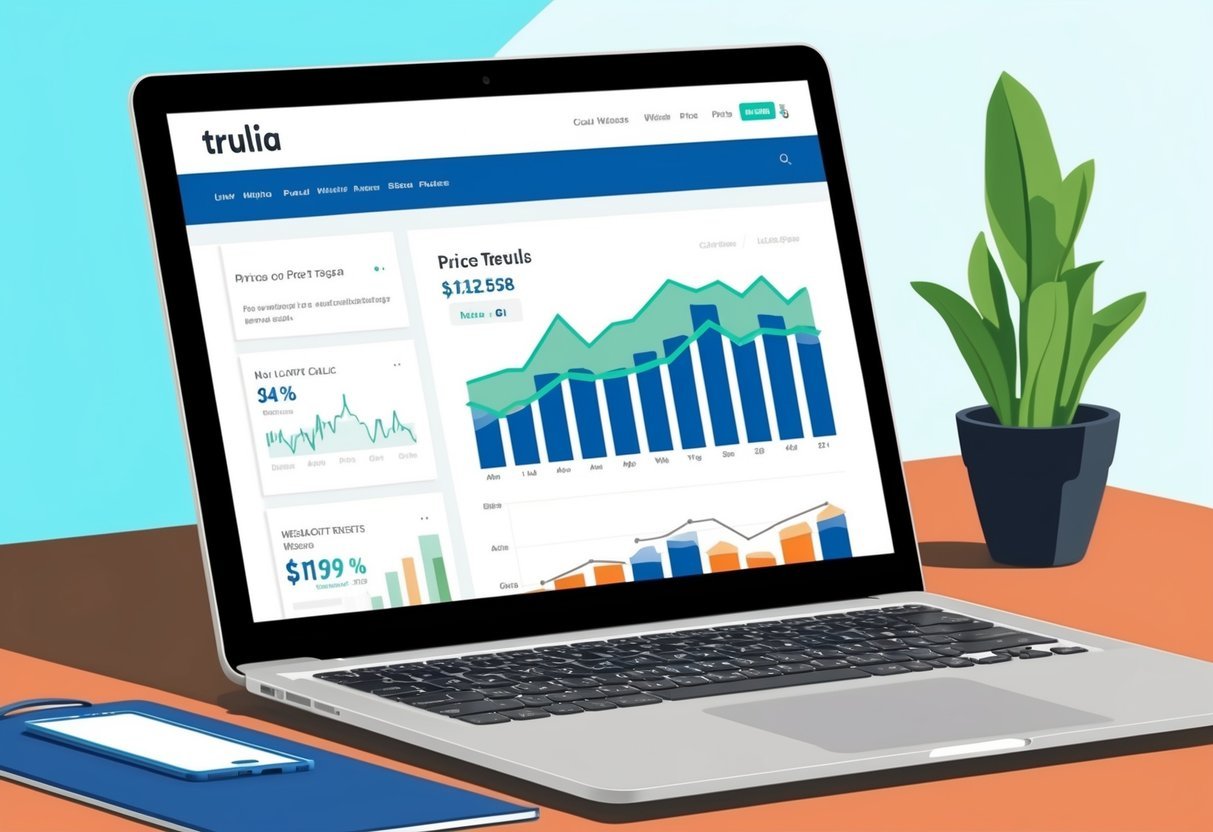
Trulia offers valuable insights into real estate price trends through its comprehensive research platform.
You can access original reporting on housing trends and news to stay informed about the latest market developments.
When exploring Trulia’s research section, you’ll find analyses conducted by writers, economists, and data scientists.
This team examines breaking news related to housing policy, tax policy, and employment patterns.
Trulia’s platform also provides information on migration trends and how the new economy impacts homes and neighborhoods.
This data can help you make more informed decisions about potential property investments or relocations.
To get a quick estimate of a property’s value, you can use Trulia’s Zestimate feature.
Keep in mind that Zestimates are designed to track the market and should not be used to artificially inflate home prices.
5) CoreLogic
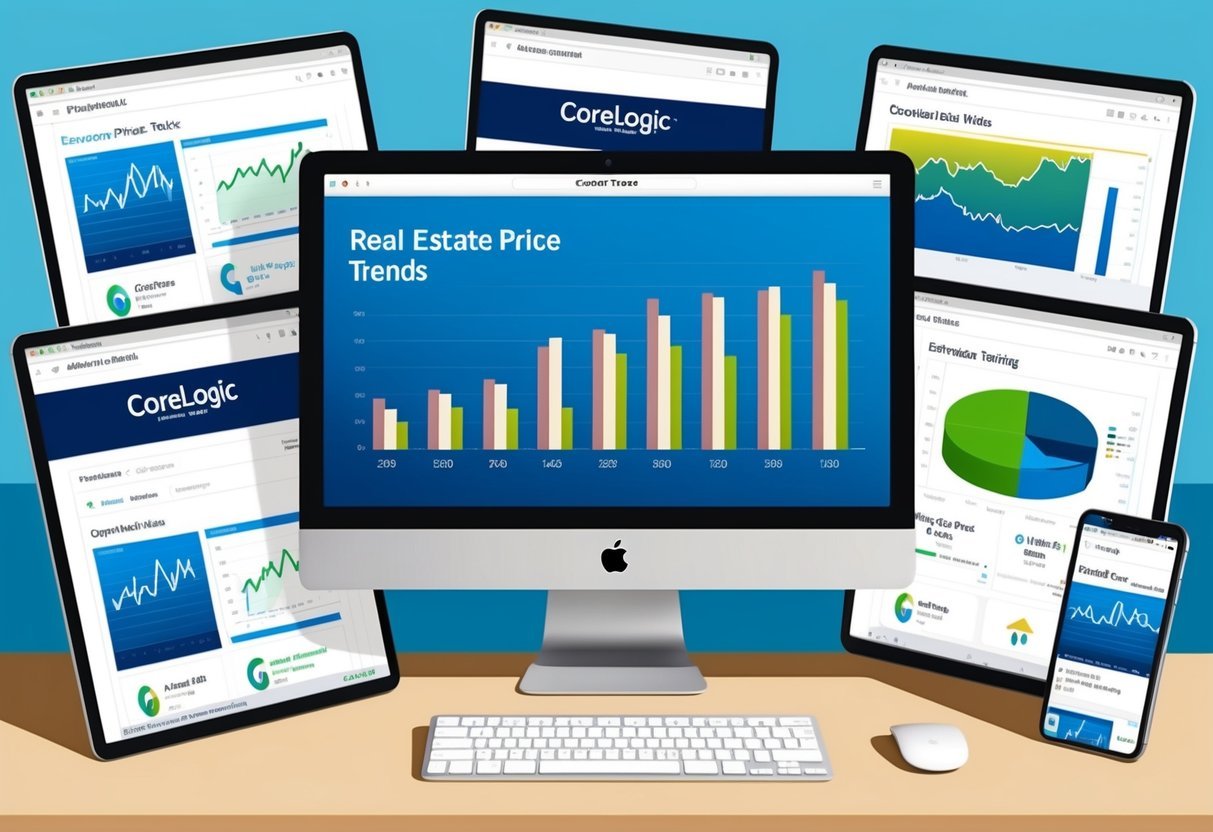
CoreLogic offers a comprehensive suite of tools for tracking real estate price trends.
Their Home Price Index (HPI) provides up-to-date information on home price movements and trends across the industry.
You can access CoreLogic’s HPI data dating back to 1976, giving you a deep historical perspective on market changes.
The index is refreshed monthly, ensuring you always have the latest insights at your fingertips.
When you use CoreLogic’s services, you’ll benefit from their team of economists who provide commentary on current market conditions.
This analysis can help you better understand the factors influencing home prices in your area of interest.
CoreLogic’s housing trends data covers national, state, and metro area levels.
This granularity allows you to focus on specific markets that matter most to your real estate goals.
6) RealtyTrac
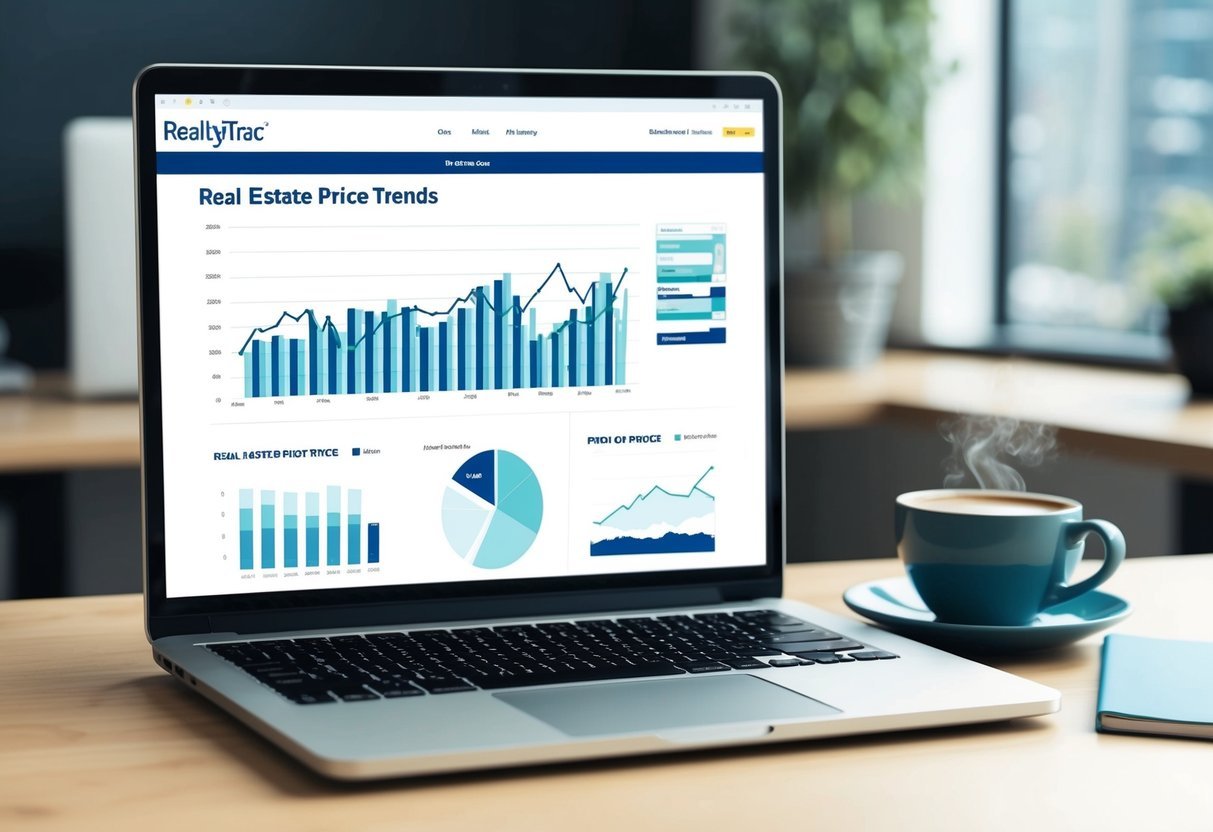
RealtyTrac provides valuable insights into real estate market trends and home values.
You can access a wealth of information about property sales, median house values, and foreclosure rates across the United States.
When using RealtyTrac, you’ll find detailed data on listing prices, sold prices, and price per square foot for both single-family homes and condos.
This information allows you to compare housing markets across different states and regions effectively.
The platform offers curated real estate market trends that can power your property transactions.
You’ll gain access to up-to-date statistics on total property sales over the past 12 months, giving you a clear picture of market activity.
7) NeighborhoodScout

NeighborhoodScout is a powerful tool for tracking real estate price trends.
You can access precise, micro-neighborhood trends and forecasts to make informed decisions about property investments.
This platform offers exclusive analytics that go beyond what free consumer real estate websites provide.
You’ll find detailed information on average home values, pricing relative to state and national benchmarks, and historical appreciation trends.
NeighborhoodScout utilizes over 600 characteristics to build comprehensive neighborhood profiles.
These include data on rental areas versus owner-occupied properties, age and style of homes, building density, and even the presence of farms or coastal settings.
The Scout Vision™ feature provides valuable insights into real estate trends and forecasts.
You can view snapshots of average annual changes in home ownership, rent prices, and vacancies over the most recent 5-year period.
Understanding Real Estate Price Trends

Real estate price trends reflect complex market dynamics influenced by various economic and social factors.
Tracking these trends provides valuable insights for buyers, sellers, and investors.
Factors Influencing Price Fluctuations
Supply and demand play a crucial role in shaping property values.
When housing inventory is low and buyer interest is high, prices tend to rise.
Conversely, an oversupply of homes can lead to price drops.
Economic conditions, including employment rates and income levels, significantly impact real estate prices.
Strong job markets and rising wages often correlate with increased property values.
Interest rates affect affordability and buying power.
Lower rates typically stimulate demand, potentially driving prices up.
Location remains a key factor.
Desirable neighborhoods, proximity to amenities, and school district quality can influence property values.
Government policies, such as tax incentives or zoning changes, can also affect real estate prices.
Importance of Tracking Market Trends
Monitoring price trends helps you make informed decisions about when to buy or sell.
By understanding market cycles, you can identify potential opportunities and avoid overpaying.
Real-time market data allows you to spot emerging patterns and adjust your strategy accordingly.
This information can be particularly valuable in fast-moving markets.
Trend analysis helps you set realistic expectations for property appreciation or depreciation.
This knowledge is crucial for long-term investment planning.
By tracking trends, you can better negotiate prices and terms.
Understanding the broader market context gives you leverage in discussions with sellers or buyers.
Regular monitoring of price trends keeps you informed about changing neighborhood dynamics and potential shifts in property values.
Analyzing Data from Real Estate Websites

Real estate websites offer valuable insights into market trends and property values.
Effective analysis of this data can help you make informed decisions about buying, selling, or investing in property.
How to Interpret Market Analysis Reports
Market analysis reports provide crucial information about real estate trends.
When reviewing these reports, pay attention to key metrics such as median list price, days on market, and inventory levels.
These indicators offer a snapshot of the current market conditions.
Look for changes in median list prices over time to understand price trends.
A rising median price often suggests a seller’s market, while a declining price may indicate a buyer’s market.
Days on market reveals how quickly properties are selling.
Shorter periods typically signify high demand, while longer periods may suggest a slower market or overpriced listings.
Inventory levels show the number of available properties.
Low inventory usually leads to increased competition among buyers, potentially driving up prices.
Utilizing Historical Data for Forecasting
Historical data is essential for predicting future real estate trends.
Many websites offer tools for tracking housing trends over extended periods.
Compare current market conditions to similar periods in the past.
Look for patterns in seasonal fluctuations, economic cycles, and local development projects that may impact property values.
Pay attention to long-term price appreciation rates in different areas.
This can help you identify neighborhoods with strong growth potential.
Consider external factors that may influence future trends, such as changes in interest rates, employment levels, or demographic shifts.
These elements can significantly impact housing demand and prices.
Use historical data to set realistic expectations for property appreciation and to identify potential risks in different market segments.
Frequently Asked Questions
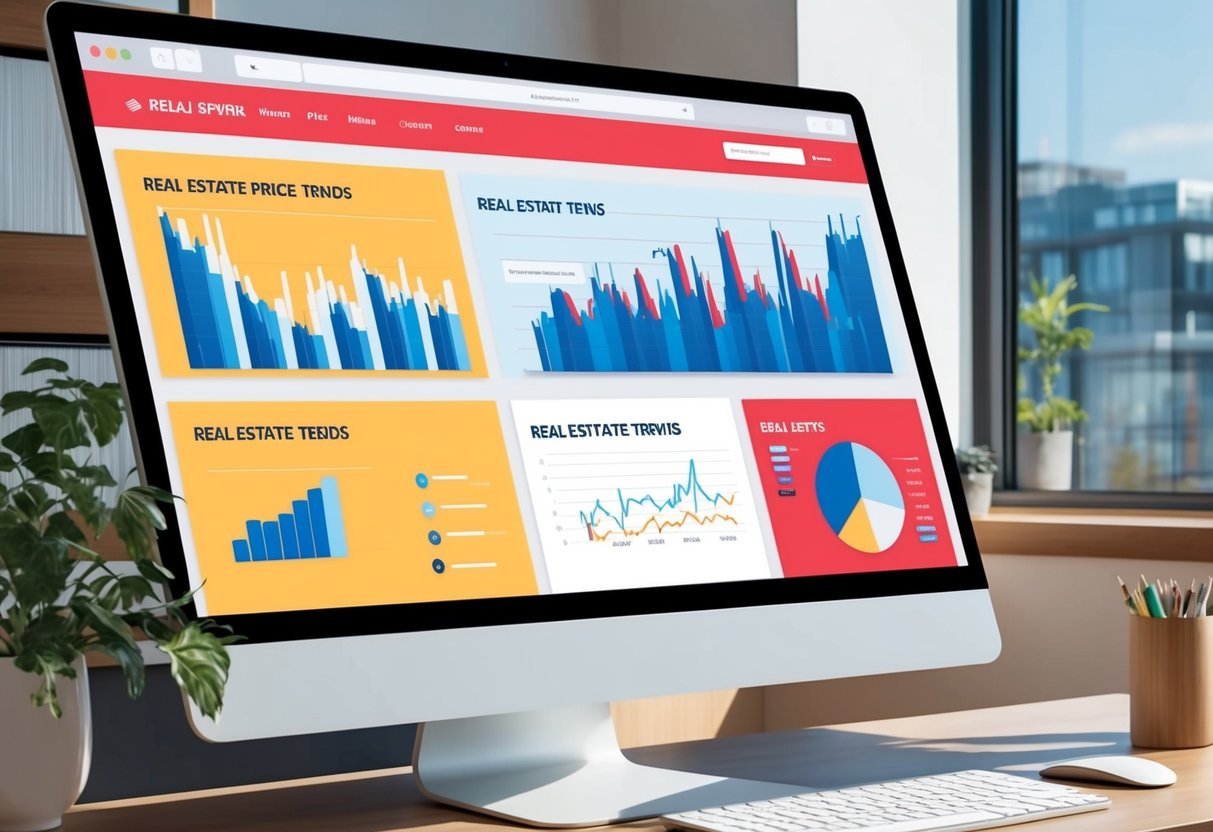
Real estate professionals and homeowners rely on various online platforms to track market trends, estimate property values, and stay informed about the housing market.
These tools offer valuable insights for making informed decisions.
What are the leading websites for analyzing real estate market trends?
Zillow and Realtor.com are popular choices for analyzing real estate trends.
These platforms provide comprehensive data on home prices, sales volumes, and market forecasts.
You can access interactive maps and charts to visualize market dynamics in specific areas.
Which real estate websites offer the most accurate home valuation data?
Redfin’s home value estimator is known for its accuracy, with estimates typically within 7.59% of the eventual sales price for off-market homes.
Zillow’s Zestimate is another widely used tool, though its accuracy can vary depending on the available property data.
Where can I find reliable real estate market updates and news?
Realtor.com and CoreLogic offer regular market updates and in-depth analysis of real estate trends.
These sites provide valuable insights on housing supply, demand, and price fluctuations across different regions.
What are the most frequently used real estate platforms for property listings?
Zillow, Trulia, and Realtor.com are among the most popular platforms for property listings.
These sites offer extensive databases of homes for sale, rental properties, and recently sold listings, making them valuable resources for buyers and sellers alike.
How do I compare real estate price trends across different regions in the USA?
Many real estate websites allow you to compare price trends across different regions.
Zillow and Redfin offer tools to visualize and analyze price differences between cities, states, or neighborhoods, helping you make informed decisions about where to buy or invest.
Are there any reputable websites that provide free access to real estate price information?
Yes, several reputable websites offer free access to real estate price information. Zillow, Trulia, and Realtor.com provide free estimates and historical price data for most properties.
You can use these resources to get a general idea of property values in your area of interest.

